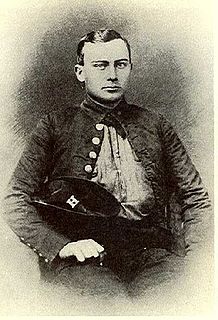A Quote by Chuck Klosterman
Let's say Twitter existed during the Civil War. We would have a better understanding of people in the Confederacy who were against slavery, people in the North who actually felt we should just let the South be the South. Because the way it is now, it seems like we have this portrait where everybody in Georgia hated Yankees and everybody in the North was enlightened. That wouldn't seem as clear cut as it does now.
Related Quotes
Most of us who were opposed to the war, especially in the early '60's - the war we were opposed to was the war on South Vietnam which destroyed South Vietnam's rural society. The South was devastated. But now anyone who opposed this atrocity is regarded as having defended North Vietnam. And that's part of the effort to present the war as if it were a war between South Vietnam and North Vietnam with the United States helping the South. Of course it's fabrication. But it's "official truth" now.
In contrast, Western historians, and those in South Korea, say the North attacked the South on June 25, 1950. Both sides agree that after the war began, the North Korean Army captured Seoul in three days and pushed as far south as Pusan before American troops arrived to drive back the North Koreans nearly as far north as the border to China.
Southern Kordofan is not a disputed territory. It is, and will remain, in the north, where the Nuba Mountains are. People believe there was a genocide there in 1990s. The Nuba, who are northerners, fought with the south in the north-south war. But they have their own individual interests, and they will remain in the north after the south splits.
It was necessary to put the South at a moral disadvantage by transforming the contest from a war waged against states fighting for their indepdence into a war waged against states fighting for the maintenance and extension of slavery...and the world, it might be hoped, would see it as a moral war, not a political; and the sympathy of nations would begin to run for the North, not for the South.
People want to know why the South is so interested in the Civil War. I had maybe, it's a rough guess, about fifty fistfights in my life. Out of those fifty fistfights, the ones that I had the most vivid memory of were the ones I lost. I think that's one reason why the South remembers the war more than the North does.
Every book that comes out, every article that comes out, talks about how - while it may have been a "mistake" or an "unwise effort" - the United States was defending South Vietnam from North Vietnamese aggression. And they portray those who opposed the war as apologists for North Vietnam. That's standard to say. The purpose is obvious: to obscure the fact that the United States did attack South Vietnam and the major war was fought against South Vietnam.
I can't say with certainty that slavery would have ended more quickly and more completely if the South had been allowed to leave and escaped former slaves had been allowed to remain free, and the North and the rest of the world had been a positive influence on the South. However, it's certainly a possibility that it would have ended sooner if the southern slave owners had agreed to a system of compensated emancipation and freed the slaves without a war and without secession, as most nations that ended slavery did. That absolutely would have been preferable to the Civil War as it happened.


































